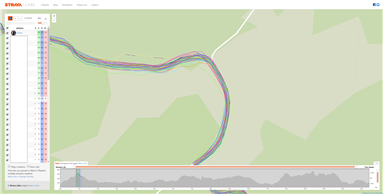Based on a few weeks of observations, GPS track on the Fenix 6 Pro is absolutely horrendous, probably the worst I have had on any device. Yet, surprisingly the total distance displayed is about right.
Case in point, I recently I ran a marathon in mostly open/forested area in Maine. Most other GPS devices had no issues, it was easy reception. Check out the traces, I picked a dozen or so other runners around me in Strava flyby; the 6 Pro is the black line
It's not just these three areas, during the entire 26 miles it was almost always the outlier. It is BY FAR the WORST GPS track of all of them. The guy I was running with had an ancient TomTom and his trace was pretty much the entire time on the road, spot on. Yet, this brand new, premium priced device from the market leader MISERABLY FAILS in the one thing it should do well, GPS tracking. It’s sad and I feel like a fool for purchasing it.
Are we aware of any incoming fixes for this? I have a few more days before I have to return this to REI.



